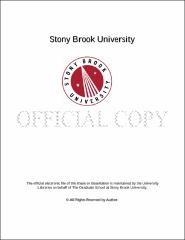| dc.identifier.uri | http://hdl.handle.net/11401/78328 | |
| dc.description.sponsorship | This work is sponsored by the Stony Brook University Graduate School in compliance with the requirements for completion of degree | en_US |
| dc.format | Monograph | |
| dc.format.medium | Electronic Resource | en_US |
| dc.format.mimetype | Application/PDF | en_US |
| dc.language.iso | en_US | |
| dc.type | Dissertation | |
| dcterms.abstract | This dissertation provides a comprehensive and theoretically grounded empirical analysis of anti-LGBT hates crimes utilizing national crime data from the Uniform Crime Report and National Crime Victimization Survey. Current accounts of anti-LGBT (lesbian, gay, bisexual, and transgender) hate crimes at the national level typically only discuss prevalence or offer descriptive statistics, and more advanced statistical analyses have used small samples and offer conflicting conclusions across studies. This project utilizes advanced regression techniques with national data to examine the factors that contribute to these crimes, which represents a major methodological advance in the study of anti-LGBT hate crimes. First, the role of macro level social factors is examined by testing the theory that violence is used against LGBT people as means of social control. Specifically, the role of increasing legal visibility through LGBT civil rights legislation is examined in relation to yearly state level hate crime rates. Secondly, the idea that intersecting identities, such as race and class play a role in risk of victimization is explored through examining how these factors correspond to the severity of violence used against LGBT victims of hate crimes. Finally, much of our understanding of hate crimes victims comes from police report data, but this overlooks victims’ non-reporting to police. Another location for identifying victims of hate crimes may be through the health care system, as victims seek help post-traumatically. Thus, the differences in reports made to the police versus reports to health care seeking behaviors among victims are explored, which will allow for examination of hate crime victims who have not reported the incident to police. By engaging in a systematic analysis of the data available on anti-LGBT hate crimes, this dissertation addresses the complex and unique nature of these crimes, furthers our theoretical understanding of the social causes of anti-LGBT hate crimes, and enhances out understanding the individual level factors that impact anti-LGBT hate crime victimization and perpetration. | |
| dcterms.available | 2018-07-09T13:25:00Z | |
| dcterms.contributor | Marrone, Catherine | en_US |
| dcterms.contributor | Fallon, Kathleen M. | en_US |
| dcterms.contributor | Shandra, Carrie | en_US |
| dcterms.contributor | Burroway, Rebekah | en_US |
| dcterms.contributor | Melzer, Scott. | en_US |
| dcterms.creator | Coston, Elizabeth | |
| dcterms.dateAccepted | 2018-07-09T13:25:00Z | |
| dcterms.dateSubmitted | 2018-07-09T13:25:00Z | |
| dcterms.description | Department of Sociology. | en_US |
| dcterms.extent | 147 pg. | en_US |
| dcterms.format | Monograph | |
| dcterms.identifier | http://hdl.handle.net/11401/78328 | |
| dcterms.identifier | Coston_grad.sunysb_0771E_13377.pdf | en_US |
| dcterms.issued | 2017-08-01 | |
| dcterms.language | en_US | |
| dcterms.provenance | Submitted by Jason Torre (fjason.torre@stonybrook.edu) on 2018-07-09T13:25:00Z
No. of bitstreams: 1
Coston_grad.sunysb_0771E_13377.pdf: 2959932 bytes, checksum: 5e2eb6cb88a8c1815aaae3579f3431bc (MD5) | en |
| dcterms.provenance | Made available in DSpace on 2018-07-09T13:25:00Z (GMT). No. of bitstreams: 1
Coston_grad.sunysb_0771E_13377.pdf: 2959932 bytes, checksum: 5e2eb6cb88a8c1815aaae3579f3431bc (MD5)
Previous issue date: 2017-08 | en |
| dcterms.subject | Sociology | |
| dcterms.subject | Criminology | |
| dcterms.title | Anti-LGBT Hate Crimes in the US | |
| dcterms.type | Dissertation | |

